- Home
- Mark Timlin
Zip Gun Boogie
Zip Gun Boogie Read online
ZIP GUN BOOGIE
For south London private detective Nick Sharman too many things have gone wrong lately. So when he is offerd a job up west, with all the luxury of a posh Knightsbridge hotel chucked in, he doesn’t refuse.
Multi-million selling LA band Pandora’s Box are in town to finish their latest album. A lot is riding on it being on time – their reputation and several million quid at least. But there have been a few strange accidents: some tapes got wiped, sending a whole lot of work down the drain, equipment has gone wrong or missing. And now one of the band is in hospital – spiked with something very deadly indeed.
What Pandora’s Box don’t want is a bunch of London cops tramping around upsetting their creative flow, so they are relying on Sharman to stop the madman responsible, who’s proving more dangerous and imaginative with each attack. With the money he’s offered and room service providing anything he orders, not to mention the allure of the mad, bad and beautiful lead singer, Ninotchka, Sharman would be stupid to refuse the job – wouldn’t he…?
Mark Timlin has written some thirty novels under many different names, including best selling books as Lee Martin, innumerable short stories, an anthology and numerous articles for various newspapers and magazines. His serial hero, Nick Sharman, who appears in Take the A-Train, has featured in a Carlton TV series, starring Clive Owen, before he went on to become a Hollywood superstar. Mark lives in Newport, Wales.
About the Author
‘The king of the British hard-boiled thriller’
– Times
‘Grips like a pair of regulation handcuffs’
– Guardian
‘Reverberates like a gunshot’
– Irish Times
‘Definitely one of the best’
– Time Out
‘The mean streets of South London need their heroes tough. Private eye Nick Sharman fits the bill’
– Telegraph
‘Full of cars, girls, guns, strung out along the high sierras of Brixton and Battersea, the Elephant and the North Peckham Estate, all those jewels in the crown they call Sarf London’
– Arena
Critical acclaim
Other books by Mark Timlin
A Good Year for the Roses 1988
Romeo’s Girl 1990
Gun Street Girl 1990
Take the A-Train 1991
The Turnaround 1991
Zip Gun Boogie 1992
Hearts of Stone 1992
Falls the Shadow 1993
Ashes by Now 1993
Pretend We’re Dead 1994
Paint It Black 1995
Find My Way Home 1996
Sharman and Other Filth (short stories) 1996
A Street That Rhymed with 3 AM 1997
Dead Flowers 1998
Quick Before They Catch Us 1999
All the Empty Places 2000
Stay Another Day 2010
OTHERS
I Spied a Pale Horse 1999
Answers from the Grave 2004
as TONY WILLIAMS
Valin’s Raiders 1994
Blue on Blue 1999
as JIM BALLANTYNE
The Torturer 1995
as MARTIN MILK
That Saturday 1996
as LEE MARTIN
Gangsters Wives 2007
The Lipstick Killers 2009
Title
This one goes out to the one I love.
dedication
1
Tuesday morning, 11.55. Nothing doing. I’d read the papers and was sitting in my office, debating whether or not to go to lunch, when the telephone rang. I picked up the receiver. ‘Nick Sharman,’ I said.
‘I was talking to Mark McBain a few weeks ago,’ a male voice said in my ear. The accent was English, but with a strong American twang which placed it somewhere in the mid-Atlantic.
‘He mentioned you,’ the voice continued.
‘Did he?’ I said. ‘How is he?’
‘Good. You helped him a while back.’
It was a statement, rather than a question.
‘That’s right.’
‘I called him up this morning and we talked some more.’
‘Yes?’ I said, hoping he’d get to the point.
‘I told him I was going to call you. He sends his love.’
‘That sounds like McBain.’
‘He said for you to call him soon.’
‘I will.’
‘Have you got his number in LA?’
‘Yes,’ I said.
My caller fell silent.
‘I presume that wasn’t the only reason you rang?’
‘What?’
‘To pass on McBain’s love.’
‘No.’
‘What then?’
‘I wonder if you could help us?’
‘Who’s us?’ I asked.
‘Pandora’s Box.’
‘Didn’t you have that album?’
‘That’s right,’ said the voice. ‘We had that album.’
The album in question was called Regrets, and until Michael Jackson came along with Thriller, it had been the biggest-selling long-playing record in history. ‘What kind of help?’ I asked.
‘I think someone tried to murder one of the band last night.’
‘Did they? I didn’t see anything about it in the papers.’
‘It hasn’t been in the papers.’
‘And who are you?’
‘My name is Roger Lomax. I look after things for the band.’
‘You’re the manager?’
‘They don’t have a manager. Just a dozen lawyers, a firm of accountants and me. That’s the way things go these days. Will you help?’
‘I don’t know what I can do.’
‘Find out who tried to kill him.’
‘What about the police?’
‘No police.’
‘Why’s that?’
There was a long pause. ‘I don’t want to talk about it on the phone. I’d rather talk to you in person. I assure you it will be worth your while. Can we meet this afternoon?’
I wasn’t doing anything. ‘Sure,’ I said. ‘Where?’
‘We’re staying at Jones’ Hotel in Knightsbridge. Do you know it?’
I didn’t, but I was a detective. ‘I’ll find it.’
‘Will you be driving?’
‘Yes.’
‘If you give me the registration number of your vehicle, I’ll make sure you’re cleared to park.’
I gave him the number.
‘The parking is at the back of the hotel,’ he told me. ‘Follow the signs, see the guy at the gate. Is three o’clock convenient?’
‘Sure.’
‘I’ll see you then,’ he said, and hung up.
I replaced the receiver and went to lunch.
2
The hotel was located in a leafy avenue in Knightsbridge. There are still quite a few if you know where to look. It appeared to consist of a whole block of tall terraced town houses knocked into one. It had a new, green-tiled roof, the bricks had been scrubbed clean, and the paintwork sparkled in the sun. I drove slowly past the front entrance at 2.45 that afternoon. There was a gent in a brown uniform dripping with gold braid and wearing a brown top hat standing by the revolving door at the top of the stone steps that led up from the pavement. I kept going until I saw an illuminated sign that read: hotel parking, and an arrow that pointed to an arched alleyway that cut right through the hotel and must have been used for carriages in the old days.
Twin iron gates had been pulled back to allow entry.
I turned slowly into the whitewashed tunnel and the exhaust of the Jaguar boomed in its confines. The tunnel opened into a cobbled mews that ran parallel to the avenue. There was another sign that directed me to turn left along the mews. I passed between the back of the hotel, scarred with black-painted fire escapes and water pipes, and the front of half a dozen bijou residences that had once been stables and were now pied-à-terres with brightly painted doors and shiny-leafed shrubs in tubs outside them.
I braked to a halt in front of a metal barrier that broke a link fence topped with razor wire. On the left of the barrier was a small, half-glassed booth. Inside was a black guy in a brown uniform complete with peaked cap. He was leaning against the back wall, looking bored. Outside stood two big white geezers in lounge suits. One held a clipboard. The one with the board said something to the other, who was carrying a portable phone, and walked through the narrow gap between the barrier and the fence and up to the driver’s window of my car. I lowered the window all the way. There was a name tag clipped to the lapel of his suit. Under a multi-coloured logo that read ‘Premiere Security’ was typewritten ‘Jack’.
‘May I help you, sir?’
‘I’m here to see Roger Lomax.’
‘Your name, please?’
‘Sharman. Nick Sharman.’
Jack consulted the clipboard. ‘Have you any ID, sir?’
I passed him my driver’s licence and he read it without moving his lips and handed it back. He glanced down at the paper on his board and walked around the front of the car to check the registration.
‘Fine, Mr Sharman,’ he said. ‘Drive straight in, across the courtyard and down the ramp. Park on the first level, please. Go through the fire door and someone will take you to Mr Lomax.’
‘Thank you.’
He signalled to the black guy who pushed a button and the barrier lifted. I engaged low drive and the car bumped across the ramp between cobbles and concrete, slid smoothly across the courtyard, through an entrance two car widths wide, and into a sodium-lit tunnel that dropped sharply away in front of the bonnet of the car. The tunnel was neatly divided in two by a kerbstone set into the middle of the road. On my side, large white arrows pointed downwards; on the other side, the reverse. I let the Jaguar coast until the road levelled and a sign above me read: level one. I found an empty space and parked.
I switched off the engine and all I could hear was my own blood pounding through my head and the ticking of the engine as it began to cool. I opened the driver’s door and stepped into chilly air that smelled of oil and petrol and cellulose. There was an orange exit sign above a grey-painted fire door about fifteen yards from where I’d stopped. I locked the door and dropped the keys into my pocket and looked at the six cars in the parking bays adjacent to mine. Six white Porsche 911 SE cabriolets, each one with a cream soft top. Beautiful. I figured there was close on half a million quid’s worth of automobiles parked there. And the numberplates were PB 1 to 6 inclusive. Not a bad life, I thought, being a rock star. Mind you, I wouldn’t have swapped any of them for my E-Type, old as it was.
As I stood there looking, the door under the sign burst open and two men and a woman came into the parking garage. One of the men was short, in his mid-forties, dressed in denim jeans and shirt, scuffed baseball boots, a down-filled waistcoat and a blue baseball cap, with NY printed on the front in yellow. Thin salt and pepper hair sprouted from under the cap, and down below his shoulders. The man with him wore a lounge suit like the guys on the gate. He looked like them too, but sans name plate. The woman was tall and blonde, about thirty and pretty good-looking under the artificial light. She was dressed in a short, spangled, red evening dress, even at that early hour. It was cut low at the back and front and exposed a mile of tanned flesh. The geezer in denim made straight for my car. ‘Great motor,’ he said. His accent was English tinged with American, just like Roger Lomax’s. ‘Want to sell it?’
‘No.’
‘Go on, you gotta. I’ll give you twenty grand.’
‘No.’
‘What do you mean, no?’ He sounded like someone who was used to having his every wish fulfilled. ‘Thirty.’
‘No,’ I said again.
‘Tell him, Pat,’ the guy in denim said to his male companion.
His companion shrugged, and I almost heard his muscles creak.
‘It’s up to him,’ he said. ‘It’s his car.’
‘Fifty grand,’ said the guy in denim.
That was so far over market value as to be a joke. ‘No,’ I said. ‘And I’m late. Thanks for the offer.’ I body swerved around the trio and made for the door. I pulled it open and two more huge geezers were standing in the tiny foyer. Again, both were wearing name tags. This time the portable phone was lying on a chair next to the lift door. The smaller of the two men held a clipboard. His tag read: ‘Ronnie’.
‘Sir?’ he said.
‘Nick Sharman to see Roger Lomax. I’ve an appointment with him at three.’
Ronnie didn’t have to consult his clipboard. Apparently the word was out. ‘Yes, Mr Sharman,’ he said. ‘Are you armed?’
‘No,’ I said back, and I wasn’t.
‘You won’t mind if we check?’
I did, but I knew I wouldn’t get past these two if I said no.
‘OK,’ I said. ‘Go ahead.’
The bigger of the two, who was extremely big, believe me, and whose name tag read ‘Big Phil’ just to drive the point home, gave me a quick and thorough search. He shook his head at his partner. ‘Thank you, Mr Sharman,’ said Ronnie. ‘My colleague will show you the way.’
So that’s what they called them now.
Big Phil pressed the button to summon the lift and the door opened immediately. ‘This way,’ he said and ushered me inside. It had recently been swept and sprayed with perfume. It was a bit different to most car-park lifts. My guide pressed the button marked 1, and the lift sped upwards. He aimed his stare at a spot two feet below the top of the lift door and kept it there. I stood behind him and aimed my stare at the suppurating boil between his hair-line and his stiff white collar and kept it there. I can play tough too. We were both silent during the short journey.
A bell rang, and the lift doors opened on the first floor as bidden. Big Phil stood to one side to let me out first. I found myself in a vaulted hall tastefully furnished in what was supposed to be Chippendale but probably wasn’t. The hall walls and ceiling were painted dusty pink and carpeted with a matching shag pile that was so thick it could have concealed a machine-gun nest. Big Phil walked me across the carpet to double doors with a discreet sign reading: bar.
‘Mr Lomax is waiting for you inside,’ he said and pushed the doors open for me. I entered but he didn’t follow. The room was in almost complete darkness. The only illumination was the oasis of light that was the bar itself. Behind it two barmen were conversing in muted tones, both polishing already gleaming glasses. Hidden speakers were playing Verdi at a volume so low as to be almost inaudible. I always reckon you get the muzak you pay for. I walked through the darkness and approached the bar. ‘Mr Lomax?’ I said with a question mark attached.
The taller of the barmen said, ‘On the upper level, sir, in the first booth.’ He pointed with one hand and I turned and allowed my eyes to get accustomed to the twilight and squinted in the direction he’d indicated. The bar area, which was huge and empty, was lined with screened-off booths. Tables and chairs were spaced across the floor just far enough apart for privacy. In the far corner of the room a pair of dark wood steps led to an area that resembled a large stage. At the back of the raised area were three more booths. The interior of the right-hand booth suddenly flared with light as whoever was sitting there struck a match and lit a cigarette. Roger Lomax I presumed and surfed across more shag pile, this time of a much darker shade, up the steps and across to the
booth. I saw two dark eyes glitter in the reflection of the coal of the cigarette as they watched me approach.
‘Roger Lomax?’ I asked.
‘Nick Sharman?’
‘Yes.’
‘Good afternoon, thanks for being so prompt. Come and join me.’ Off the phone, his mid-Atlantic accent was more pronounced, and it grated on my ears.
I slid into the booth. It was pitch dark except for the firefly of red at the tip of his cigarette. He must have read my mind. ‘Would you like a little light?’ he asked.
‘Why not?’
He turned and reached to the back of the booth and found a switch. A single dim bulb in a glass shade struggled to illuminate us. ‘Is that better?’
‘Yes,’ I said.
He was sprawled across all three seats opposite me, with his back supported by the wall. The way he was sitting, I couldn’t tell if he was tall or short. I guessed he was between thirty and thirty-five with real thick, real long, black hair that he kept pushing out of his face with big, strong-looking hands. On the third finger of his right hand was an extravagant silver and turquoise ring. Even in the faint light he looked tanned and fit. He was dressed in a black shirt and a black jacket that was patrolled with a design in jet beads that reflected the light. In front of him was a glass the size of a small soup tureen filled with a pale liquid, two packets of Marlboro Lite, a book of hotel matches, an ashtray and a shiny brown foolscap folder with the hotel name embossed in gold upon it. The ashtray was already full to overflowing.
‘Would you like a drink?’ he asked.
‘Thanks.’
‘What’ll you have?’
I pointed at his glass. ‘What’s that?’
‘Daiquiri.’
‘That’ll do.’
I didn’t see the gesture but the barman did. He must have had eyes like a vulture. He appeared at the booth within seconds. ‘Mr Lomax?’
‘Two more of these,’ said Roger Lomax, gesturing at his glass.
‘And make a big jug. This could be a long afternoon.’

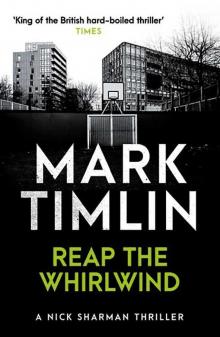 Reap the Whirlwind
Reap the Whirlwind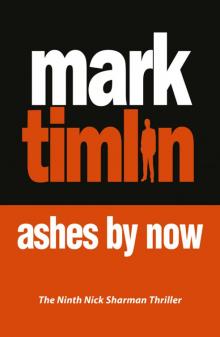 Ashes by Now
Ashes by Now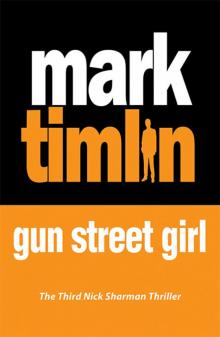 Gun Street Girl
Gun Street Girl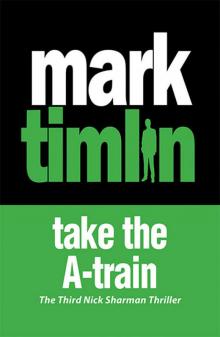 Take the A-Train
Take the A-Train Pretend We're Dead
Pretend We're Dead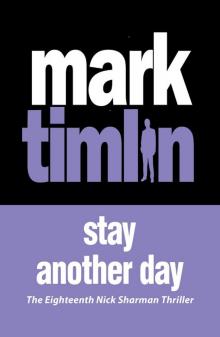 Stay Another Day
Stay Another Day Paint It Black
Paint It Black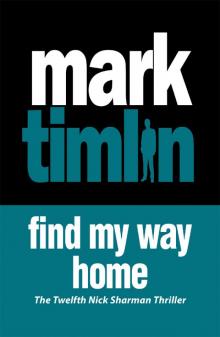 Find My Way Home
Find My Way Home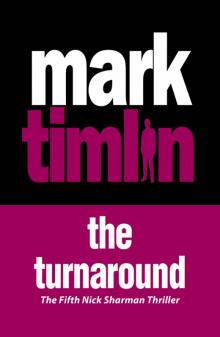 The Turnaround
The Turnaround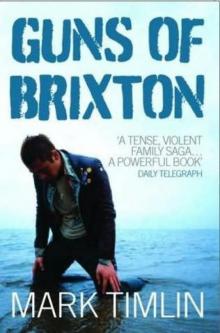 Guns Of Brixton
Guns Of Brixton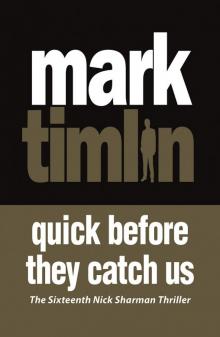 Quick Before They Catch Us
Quick Before They Catch Us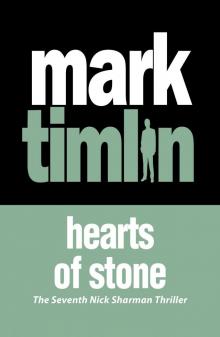 Hearts of Stone
Hearts of Stone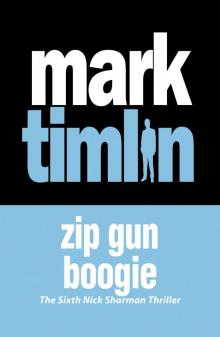 Zip Gun Boogie
Zip Gun Boogie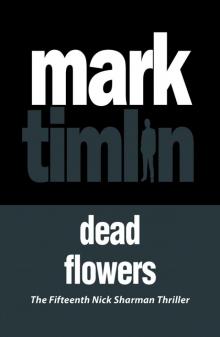 Dead Flowers
Dead Flowers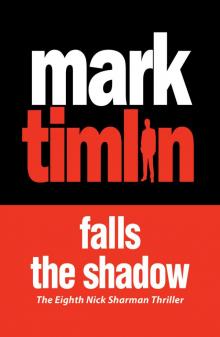 Falls the Shadow
Falls the Shadow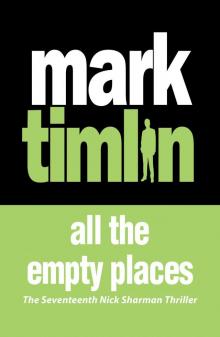 All the Empty Places
All the Empty Places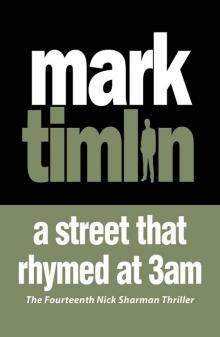 Street that Rhymed at 3am
Street that Rhymed at 3am